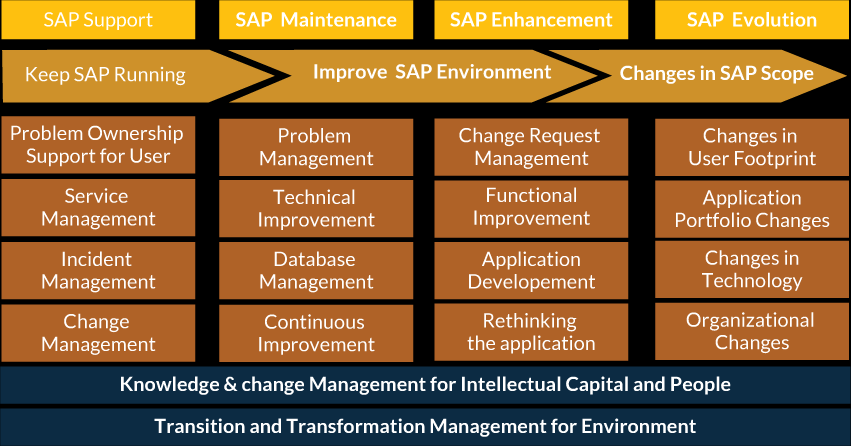SAP Production Support Services
Laurus Technologies provides an array of production support services designed to assist businesses in the effective management and maintenance of their SAP systems. These services are crafted to ensure the ongoing operational efficiency, optimization, and alignment of SAP systems with the evolving needs of organizations. The following is a comprehensive list of commonly offered SAP production support services.
Incident Management: Swiftly responding to and resolving technical issues, errors, and glitches that emerge within the SAP system to ensure the seamless continuity of operations.
Problem Management: Thoroughly identifying the root causes of recurring issues and implementing solutions that curtail their recurrence, thereby bolstering the overall stability of the system.
Change Management: Skillfully handling and executing changes within the SAP environment, including updates, patches, and enhancements, while mitigating risks and minimizing potential disruptions.
Release Management: Strategically planning, coordinating, and executing SAP system releases, upgrades, and new versions to facilitate smooth transitions and minimize instances of downtime.
Performance Monitoring and Tuning: Vigilantly monitoring system performance, identifying performance bottlenecks, and implementing optimization measures to enhance system speed and efficiency.
Security Management: Assuring the robust security of SAP systems through the application of stringent access controls, user authentication mechanisms, data encryption protocols, and periodic security audits.
Backup and Recovery Services: Establishing and managing comprehensive data backup processes, disaster recovery plans, and business continuity strategies to safeguard against data loss and system downtime.
Database Management: Proficiently administering and optimizing the foundational database systems to guarantee the integrity of data, efficient storage utilization, and optimal overall system performance.
System Monitoring and Alerting: Deploying proactive monitoring tools and alerts to promptly identify potential issues before they can adversely impact system performance or end-user experience.
User Support and Training: Furnishing end-users with proficient support, troubleshooting assistance, and comprehensive training to ensure their effective utilization of the SAP system.
Documentation and Knowledge Management: Creating and maintaining thorough documentation, comprehensive knowledge bases, and standardized operating procedures for the SAP environment.
System Enhancements and Customizations: Designing and implementing bespoke functionalities, tailored reports, and enhancements that cater to the evolving requirements of the organization.
Interface and Integration Management: Ensuring seamless integration between SAP and other systems through the adept management of interfaces, APIs, and middleware.
Vendor Relationship Management: Skillfully managing interactions and collaborations with third-party vendors, including SAP, to synchronize support services, handle license renewals, and facilitate updates.
24/7 Support and Monitoring: Extending continuous support and vigilant monitoring services around the clock to promptly address critical issues and minimize periods of system downtime.
Continuous Improvement Initiatives: Identifying avenues for enhancing system efficiency, elevating user experience, and optimizing overall system performance through ongoing process refinement.
Compliance and Regulatory Support: Ensuring that the SAP system aligns meticulously with industry regulations and compliance standards, including providing valuable support during audit preparations.
Service Level Agreement (SLA) Management: Precisely defining and adhering to Service Level Agreements (SLAs) that meticulously outline response times, issue resolution benchmarks, and the overall quality of service delivery.
Data Archiving and Management: Managing data retention policies, conducting archival of historical data, and assuring the integrity and availability of data.
Proactive System Health Checks: Regularly conducting thorough health assessments and checks of the system to identify potential issues in advance and recommend preemptive measures.

